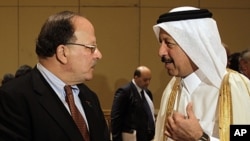While many of its neighbors grapple with civil unrest, the small country of Qatar in the Persian Gulf continues to strengthen its role as a regional leader. But whether the absolute monarchy will be able to retain its leadership position in a post-Arab-spring Middle East remains unclear.
In March, Qatar gained international praise when it became the first Arab nation to send troops to Libya to reinforce NATO’s combat mission against pro-Gadhafi forces.
The support did not stop there. Qatar also became the first Arab state to recognize Libyan rebels as the legitimate representatives of their country. It hosted the first meeting of the international Contact Group on Libya and used some of its vast oil wealth to provide the rebel’s National Transitional Council with $400 million in aid.
Some international media reports have described Qatar’s efforts as somewhat unexpected. However, Gulf analyst Mehran Kamrava, director of Georgetown University’s Center for International and Regional Studies in Doha, says he was not surprised.
“[Qatar’s] involvement in Libya early on and so extensively did not necessarily come as a surprise because it is consistent with very proactive diplomacy that has propelled Qatar to the forefront of regional affairs,” said Kamrava.
There has also been some criticism. Elliott Abrams, senior fellow for Middle Eastern Studies at the New York-based Council on Foreign Relations says that while Qatar has been an important partner for Libya, its motives are solely aimed at advancing its own interests.
“The decision to back the rebels was certainly not based on any great principle. It isn’t as if this was done to advance democracy and personal freedom because if that were the case, they wouldn’t be taking the position they do in Bahrain,” said Abrams.
At the same time as Qatar began supporting military intervention in Libya, the Gulf Cooperation Council, of which Qatar is a member, was also using its troops to help quell pro-democracy demonstrations in Bahrain.
Qatar’s leader, Sheikh Hamad bin Khalifa al-Thani, later expressed his support for Bahrain’s crackdown on dissidents, which rights groups say left over 30 people dead.
According to Abrams, Qatar’s varied positions on external matters suggest that it is likely to carry on with a carefully nuanced and deliberately crafted approach to its foreign policy.
“The next time around, we may not find that we’re on the same side as Qatar. The expansion of Qatari influence is a mixed bag, a mixed blessing,” he said.
Qatar is an ally to both the United States and Iran. How it will progress with its international relations remains to be seen. What is almost certain, however, is that it will try to start reaping rewards in the new Libya as soon as possible.
Libya is full of investment opportunities, one of the most lucrative being its national oil company - the gatekeeper for the largest known reserves of crude in Africa.
Toby Jones, assistant professor of Middle East history at Rutgers University, says while foreign states are assessing how they can benefit form Libya’s crisis, it is still too early to determine who will be involved in the reconstruction process and in what capacity.
“Who is going to be calling the shots in Tripoli when things settle remains unclear and that’s going to have ultimately an impact on not only which regional actors are able to be involved, weather it’s Qatar, the UAE, Egypt or somebody else, but also which global actors are going to be able to be involved,” said Jones.
Qatar will have to compete with Chinese, Russian and Western companies. And while the tiny nation’s enormous wealth may be able to influence Libyan rebels now, that may not be the case in the future.
Abrams says the same can be said of Qatari leadership in the region. There is a possibility it could become irrelevant as more countries in the Middle East attempt to push ahead with democracy.
“If they have new democratic leadership, then I think that even though they don’t have money in the way the Qataris do, they can really make a challenge to Qatar: what gives you the right to lead the Arab World? You have a tiny population and you have what is essentially an absolute monarchy, we want to lead the Arab world,” said Abrams.
So, as demands for democracy continue to bring change to all corners of the region, it appears Qatar will just have to wait and see what role it will have, not only in the new Libya, but also in the new Middle East.
Amid Season of Unrest, Qatar Seeks to Expand Role in Middle East




